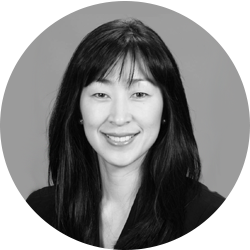supported by


Bonnie An Henderson, MD
Bonnie An Henderson, MD is a Partner in Ophthalmic Consultants of Boston and a Clinical Professor at Tufts University School of Medicine in Boston, Massachusetts.
Please share with us your background.
I grew up outside Chicago but moved out East for college and medical school. I trained in Boston and have stayed there ever since. I spent the first decade as a full-time academician at Harvard/ Massachusetts Eye and Ear Infirmary (MEEI) then transitioned to full-time private practice for the past decade. It took me a while to let go of my midwestern roots, but I can safely say that I am a Bostonian. I can even say, “Paak the caa at Haavaad Yaad” with a mean Boston accent.
What is the focus of your current research?
Currently, I have been trying to decipher the mystery of negative dysphotopsias. I have been collaborating with a brilliant recent graduate, Ivayla Geneva, MD, PhD, and together we are attempting to discover the etiology and also some solutions. We have just finished a prospective multicenter masked trial, and we will have interesting results to share in the next 6 months.
What has your experience been collaborating with industry?
When I was a junior faculty member at MEEI, I had the idea of starting a course to teach cataract surgery to residents. My plan was to invite the best faculty members from around the country and have a weekend-long cataract course that would be open to all second-year residents in the United States. As you can imagine, that was an expensive plan. Although the chairperson at MEEI was supportive in theory, I would have to raise all the necessary funds to start the program. I had no prior experience working with industry and did not know a single person at any of the companies, nor did they know me. I applied for educational grants from all of the major cataract companies, and companies such as Alcon and Leica were very responsive. I am grateful to the people at Alcon’s Hospital Accounts Management and Medical Education departments for having enough faith in me to provide me my first grant. Because of industry’s support, the Harvard Cataract Course was launched.
This first interaction led to many more over the years. I have always felt the relationships have been mutually beneficial as well as beneficial for my patients.
In your opinion, how is the role of women in ophthalmology evolving?
When I entered ophthalmology in 1994, men outnumbered women ophthalmologists 10:1. At the national meetings, the audience was a sea of men in dark-colored suits. Over the past 20 years, we have seen greater numbers of females entering the field, and now there are equal numbers of men and women graduating every year. Women’s role in ophthalmology continues to evolve with women holding every imaginable role and leading nearly every ophthalmic organization.
What, if any, hurdles do you feel women in health care still face?
In the United States, the discrimination against women ophthalmologists has improved. Although there is still inequality in the numbers of women at the podium, on the boards, and in leadership positions, there have been great strides in improving this discrepancy. However, in many international ophthalmic communities, there is still progress to be made. Women can help improve the standing of female colleagues by inviting deserving women to join them in projects, meetings, and committees. As the talents of female ophthalmologists start to be recognized by men and women, this will help change the attitudes toward women overall.
What advice can you offer to young female ophthalmologists who are still in training or just beginning their careers?
The advice I would give to young female ophthalmologists is the same that I would give to young male ophthalmologists. It is important to earn the respect of your colleagues by being a good physician, good partner, and good coworker. Excel in your work, and that, in turn, will make you valuable to your group. If you want to be recognized in a larger sphere, do something worthwhile outside of your immediate practice. Don’t expect to be recognized if you haven’t done anything outside of normal work, just because you are a woman.
Also, try to figure out what you want in your career. There is no “correct” path. Try to prioritize what is important to you. Don’t be afraid to say yes, but don’t be afraid to say no either.
Lastly, sleep less, work more efficiently, and spend time with the people you love and respect.


